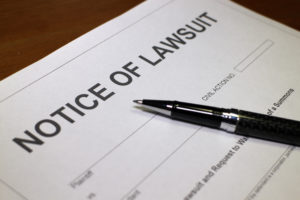Taking a Dispute to Court
General Civil Litigation | Commercial Disputes | Personal Disagreements

You’ve entered into an agreement with a business associate or another person, and they haven’t kept their promises. You have a neighbor who continually encroaches on your property without permission. You are involved in a dispute over the purchase of real property. There are countless ways you can become involved in disagreements, and, if you can’t resolve them amicably, you often have the right to sue in court to get the outcome you want.
At The Legal Café, we can connect you with an experienced attorney who can review your case, tell you whether it has merits, and protect your rights throughout the legal process. Fill out our online form or come to the Café, at 114 Main Street in the heart of the Fort Worth courthouse district.
The Common Types of Civil Litigation
The American judicial system divides disputes into two categories: criminal prosecutions and civil litigation. Criminal prosecutions are always initiated by a governmental entity. Whenever a dispute arises between two or more private citizens, including businesses, legal proceedings take place in a civil court.
Though a civil lawsuit may be based on a wide range of allegedly wrongful acts, most civil litigation falls into the following five categories:
- Breach of contract – This category typically involves the failure to do what was promised in a contract, either by failing to deliver at all, delivering substandard or unacceptable goods, or delivering the wrong goods. Many contract disputes arise because of lack of clarity in a written or oral agreement.
- Torts – Technically, a tort is any type of civil wrong other than a breach of contract. It applies primarily to personal injury claims, including serious and catastrophic injury and wrongful death.
- Property disputes – This category includes disagreements about property lines or ownership, the use of property, access to or easements over property, or buildings/trees that encroach on property.
- Class action lawsuits – A class action usually addresses contract, tort, or property issues but allows all parties who have suffered the same loss to join together, providing additional evidentiary support while minimizing costs.
- Complaints against the government – Claims against a city, county, or state government can allege that actions by the government have caused harm or that laws/statutes/ordinances violate citizens’ constitutional rights.
Come to The Legal Café today and get connected with an experienced civil trial attorney. Complete our online form or visit us in downtown Fort Worth.
Steps Involved in Resolving a Legal Dispute in Court
The civil litigation process includes:
- The filing of a civil complaint – Your attorney will file a document in the appropriate court, setting forth the facts of your case, as well as the ways your rights have been violated. The complaint must be filed within a specific period of time after your injury or loss. Once you file, the defendant has a limited period of time to file an answer to the complaint. If they don’t, you have the right to ask for a default judgment.
- The discovery period – Once the complaint and answer are timely filed, both parties have a period of time, established by the court on a case-by-case basis, to gather as much evidence as possible. Both parties have a right to equal access to all evidence and information about the case. One party may not hide or fail to disclose relevant evidence.
- Pre-trial matters – Because American civil courts are overloaded with cases, judges typically work hard to resolve disputes before trial or minimize the issues that need to be resolved at trial. Judges typically encourage parties to settle but have no power to compel them to do so. Either party may, however, file a motion before trial to dismiss the lawsuit, throw out certain claims, or ask the court to rule in their favor without a trial. In addition, because some evidence gathered may be inadmissible at trial, the court will hold hearings to determine what evidence can and cannot be introduced at trial.
- The trial – Apart from the actual arguments, examinations, and cross-examinations that make up the trial, there are two critical events—the selection of the jury and the instructions of law to the jury.
- Jury selection – Jury selection, or “voir dire,” is slightly different from court to court. However, during the jury selection process, both parties have the right to object to proposed jurors and have them removed from the pool. The parties typically have a limited number of “peremptory” challenges where they can strike a juror for any reason, as well as an unlimited number of “challenges for cause,” such as when there’s evidence that a juror would not be impartial.
- Instructions of law – In the American civil justice system, the jury makes determinations of fact only. The court provides them with instructions regarding how they must apply the law, based on their findings of fact. Both parties propose instructions, but the judge ultimately determines what instructions go to the jury.
Connect with an Experienced Civil Trial Lawyer Today
Come to The Legal Café or complete our online form to find an attorney to protect your rights.

